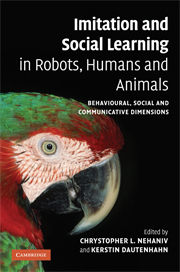 Imitation and Social Learning in Robots, Humans and Animals
Imitation and Social Learning in Robots, Humans and Animals Published online by Cambridge University Press: 10 December 2009
Introduction
Humans are often characterized as the most behaviourally flexible of all animals. Evolution has stumbled upon an unlikely but very effective trick for achieving this state. Relative to most other animals, we are born ‘immature’ and helpless. Our extended period of infantile immaturity, however, confers us with benefits. It allows us to learn and adapt to the specific physical and cultural environment into which we are born. Instead of relying on fixed reflexes adapted for specific environments, our learning capacities allow us to adapt to a wide range of ecological niches, from Alaska to Africa, modifying our shelter, skills, dress and customs accordingly. A crucial component of evolution's design for human beings is imitative learning, the ability to learn behaviours by observing the actions of others.
Human adults effortlessly learn new behaviours from watching others. Parents provide their young with an apprenticeship in how to behave as a member of the culture long before verbal instruction is possible. In Western culture, toddlers hold telephones to their ears and babble into thin air. There is no innate proclivity to treat hunks of plastic in this manner, nor is it due to trial-and-error learning. Imitation is chiefly responsible.
Over the past decade, imitative learning has received considerable attention from cognitive scientists, evolutionary biologists, neuroscientists and robotics researchers. Discoveries in developmental psychology have altered theories about the origins of imitation and its place in human nature.
To save this book to your Kindle, first ensure [email protected] is added to your Approved Personal Document E-mail List under your Personal Document Settings on the Manage Your Content and Devices page of your Amazon account. Then enter the ‘name’ part of your Kindle email address below. Find out more about saving to your Kindle.
Note you can select to save to either the @free.kindle.com or @kindle.com variations. ‘@free.kindle.com’ emails are free but can only be saved to your device when it is connected to wi-fi. ‘@kindle.com’ emails can be delivered even when you are not connected to wi-fi, but note that service fees apply.
Find out more about the Kindle Personal Document Service.
To save content items to your account, please confirm that you agree to abide by our usage policies. If this is the first time you use this feature, you will be asked to authorise Cambridge Core to connect with your account. Find out more about saving content to Dropbox.
To save content items to your account, please confirm that you agree to abide by our usage policies. If this is the first time you use this feature, you will be asked to authorise Cambridge Core to connect with your account. Find out more about saving content to Google Drive.